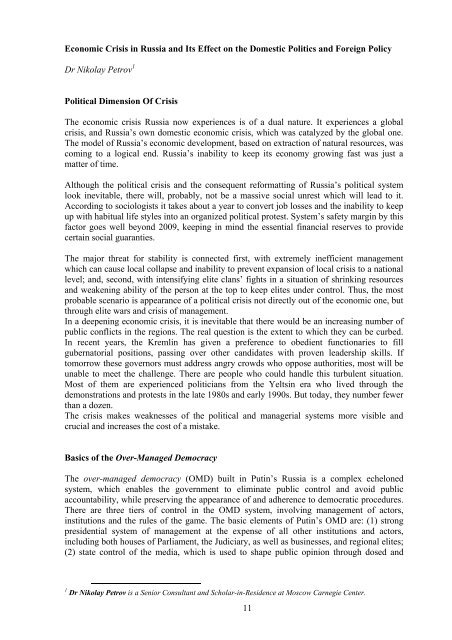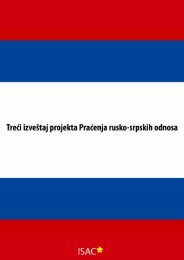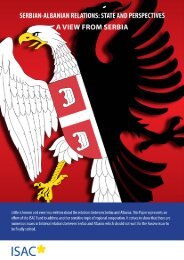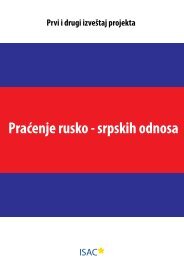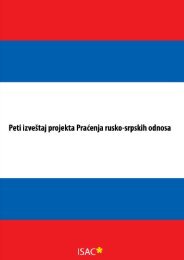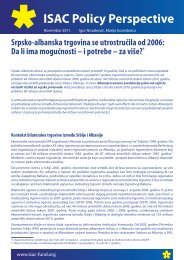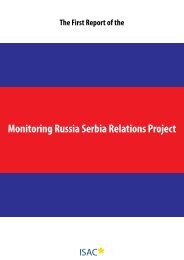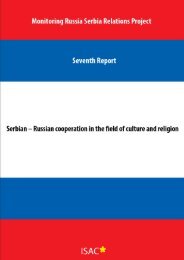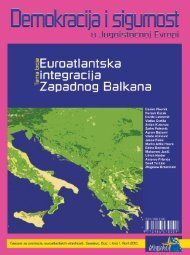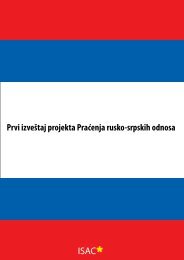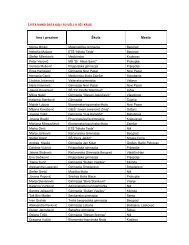MONITORING RUSSIA SERBIA RELATIONS - ISAC Fund
MONITORING RUSSIA SERBIA RELATIONS - ISAC Fund
MONITORING RUSSIA SERBIA RELATIONS - ISAC Fund
- No tags were found...
You also want an ePaper? Increase the reach of your titles
YUMPU automatically turns print PDFs into web optimized ePapers that Google loves.
Economic Crisis in Russia and Its Effect on the Domestic Politics and Foreign PolicyDr Nikolay Petrov 1Political Dimension Of CrisisThe economic crisis Russia now experiences is of a dual nature. It experiences a globalcrisis, and Russia’s own domestic economic crisis, which was catalyzed by the global one.The model of Russia’s economic development, based on extraction of natural resources, wascoming to a logical end. Russia’s inability to keep its economy growing fast was just amatter of time.Although the political crisis and the consequent reformatting of Russia’s political systemlook inevitable, there will, probably, not be a massive social unrest which will lead to it.According to sociologists it takes about a year to convert job losses and the inability to keepup with habitual life styles into an organized political protest. System’s safety margin by thisfactor goes well beyond 2009, keeping in mind the essential financial reserves to providecertain social guaranties.The major threat for stability is connected first, with extremely inefficient managementwhich can cause local collapse and inability to prevent expansion of local crisis to a nationallevel; and, second, with intensifying elite clans’ fights in a situation of shrinking resourcesand weakening ability of the person at the top to keep elites under control. Thus, the mostprobable scenario is appearance of a political crisis not directly out of the economic one, butthrough elite wars and crisis of management.In a deepening economic crisis, it is inevitable that there would be an increasing number ofpublic conflicts in the regions. The real question is the extent to which they can be curbed.In recent years, the Kremlin has given a preference to obedient functionaries to fillgubernatorial positions, passing over other candidates with proven leadership skills. Iftomorrow these governors must address angry crowds who oppose authorities, most will beunable to meet the challenge. There are people who could handle this turbulent situation.Most of them are experienced politicians from the Yeltsin era who lived through thedemonstrations and protests in the late 1980s and early 1990s. But today, they number fewerthan a dozen.The crisis makes weaknesses of the political and managerial systems more visible andcrucial and increases the cost of a mistake.Basics of the Over-Managed DemocracyThe over-managed democracy (OMD) built in Putin’s Russia is a complex echelonedsystem, which enables the government to eliminate public control and avoid publicaccountability, while preserving the appearance of and adherence to democratic procedures.There are three tiers of control in the OMD system, involving management of actors,institutions and the rules of the game. The basic elements of Putin’s OMD are: (1) strongpresidential system of management at the expense of all other institutions and actors,including both houses of Parliament, the Judiciary, as well as businesses, and regional elites;(2) state control of the media, which is used to shape public opinion through dosed and1 Dr Nikolay Petrov is a Senior Consultant and Scholar-in-Residence at Moscow Carnegie Center.11


